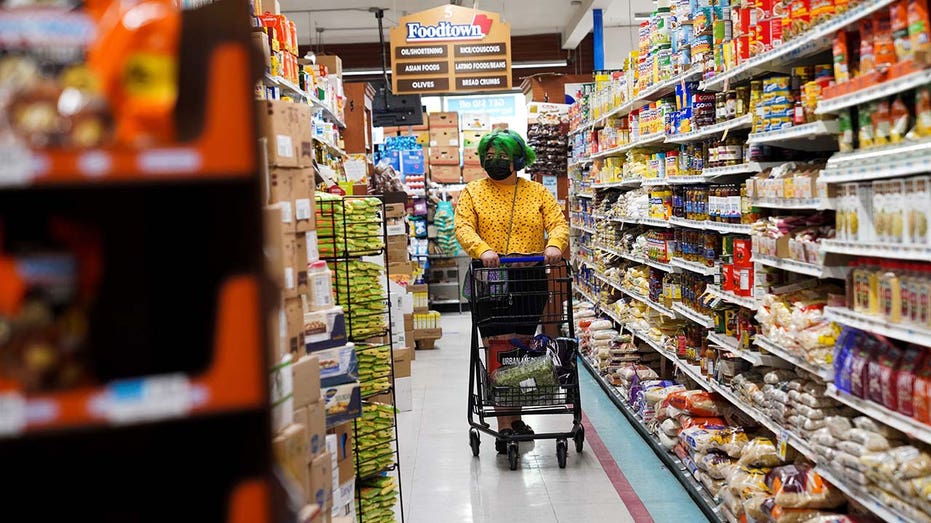US consumers expect high inflation to persist this year, NY Fed survey shows
New York Fed survey shows short-term inflation expectations are rising
Inflation hitting lower-end consumers 'much harder': Kenny Polcari
SlateStone Wealth chief market strategist Kenny Polcari and Mayflower Advisors managing partner Larry Glazer discusses the markets, inflation and the Federal Reserve.
U.S. consumers expect inflation to remain elevated for the rest of the year, but think that price gains will be low and stable in the long-run as the economic shock from the pandemic fades, according to a key Federal Reserve Bank of New York survey published this week.
The survey showed that short-term inflation expectations are rising: A majority of respondents think the high inflation environment will not fade over the next 12 months, but expect the price spike to taper off in the next three years and not persist beyond that.
WHAT IS STAGFLATION? WHY ECONOMISTS ARE WORRYING ABOUT A 1970S-STYLE CATASTROPHE
"While short-term inflation expectations have continued to trend upward, medium-term inflation expectations appear to have reached a plateau over the past few months, and longer-term inflation expectations have remained remarkably stable"
"While short-term inflation expectations have continued to trend upward, medium-term inflation expectations appear to have reached a plateau over the past few months, and longer-term inflation expectations have remained remarkably stable," the researchers wrote in a blog post, which was co-authored by New York Fed President John Williams.
The survey plays a critical role in determining how Fed policymakers respond to the recent inflation spike. That's because actual inflation depends, at least in part, on what consumers think it will be. It's a sort of self-fulfilling prophecy – if everyone expects prices to rise by 3% in the year, that signals to businesses that they can increase prices by at least 3%. Workers, in turn, will want a 3% pay raise to offset the rising costs.

A customer shops at a store in New York, May 11, 2022. (Wang Ying/Xinhua via Getty Images / Getty Images)
"The risk is rising that an extended period of high inflation could push longer-term expectations uncomfortably higher," Fed Chairman Jerome Powell said recently.
The Fed's preferred measure of inflation – the personal consumption expenditures price index – continued to run hot in April, according to new data released on Friday by the Bureau of Economic Analysis. Core prices, which exclude the more volatile measurements of food and energy, soared 4.9% in the year through April. Including food and energy, prices jumped 6.3%.
Both measurements are near a 40-year high. It marks the 13th consecutive month the gauge has been above the central bank's target range of 2%.
In response, the Federal Reserve has taken a significantly more hawkish approach to fighting inflation: After hiking the key interest rate by a quarter-percentage point in March, policymakers this month approved an even steeper, half-percentage point increase. They have signaled that similarly sized increases are on the table at coming meetings.
"Inflation is much too high, and we understand the hardship it is causing, and we are moving expeditiously to bring it back down," Powell told reporters after the Fed's most-recent two-day meeting. "Assuming that economic and financial conditions evolve in line with expectations, there is a broad sense on the committee that additional 50 basis point increases should be on the table at the next couple of meetings."

Federal Reserve Chair Jerome Powell pauses during a news conference in Washington on Jan. 29, 2020. (AP Photo/Manuel Balce Ceneta, File / AP Newsroom)
The biggest question now is whether central bank officials can successfully tame inflation and stabilize prices without triggering an economic recession. Raising the federal funds rate tends to create higher rates on consumers and business loans, which slows the economy by forcing them to cut back on spending.
Economic growth is already slowing, although consumer spending and business investment remain strong. Last week, the Bureau of Labor Statistics reported that the economy unexpectedly shrank in the first quarter of the year, marking the worst performance since the spring of 2020, when the U.S. economy was still deep in the throes of the COVID-induced recession.
CLICK HERE TO READ MORE ON FOX BUSINESS
Powell has acknowledged there could be some "pain associated" with reducing inflation and curbing demand but pushed back against the notion of an impending recession, identifying the labor market and strong consumer spending as bright spots in the economy. Still, he has warned that a soft landing – the sweet spot between cooling demand without crushing it and triggering a recession – is not assured.
"It will be challenging, it won’t be easy. No one here thinks that it will be easy. Nonetheless, we think there are pathways... for us to get there," Powell said during a recent interview with Marketplace.





















